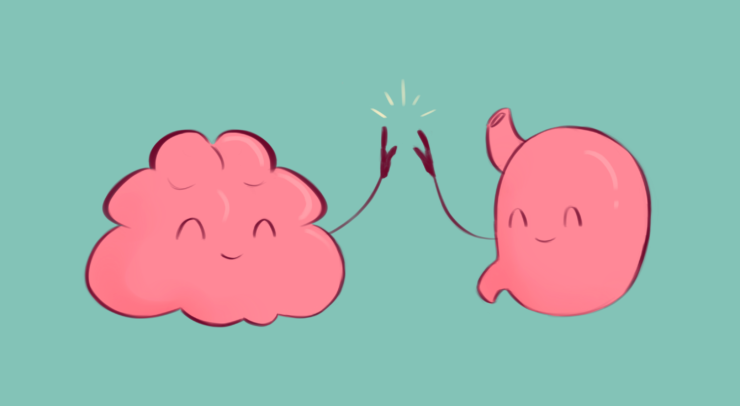ANXIETY UNFORTUNATELY CAN’T BE CURED WITH A SPOONFUL OF YOGURT
If you spend a little time on the internet, you’ll find lots of people talking about gut health. Some are doctors, patients, scientists and they’ll say stuff like, “you need good gut bacteria.”
Sometimes they emphasize how gut bacteria can help with gut conditions, like irritable bowel syndrome (IBS). Some, though, are making much bigger claims, stating both “good and bad bacteria living inside your gut can affect your mental health.”
While some suggestions to improve gut health involve eating or drinking more fermented things (like kimchi or kombucha), other people are recommending dietary supplements and regimens of expensive pills.
Is this all part of an exploitative growing gut health industry worth billions of dollars? Or is there anything to these claims? There’s definitely some interesting science here but there are also lots of mysteries left to solve. Big questions like: What is a gut feeling? And what exactly is the link between the gut and mood or mental health?
What’s the research?
Our tour into the research begins in the early 2010s, when scientists noticed that some individuals with gut conditions like IBS also had stress or anxiety; this leads them to wonder if that’s due to the fact that gut problems are extremely unpleasant or if there’s something more at play here? Was the gut somehow influencing emotions?
They designed an experiment that relied on the quirks of lab mice, where some have different strains or temperaments from other mouse strains. For the purpose of this study, two different strains were chosen specifically for their temperaments. One tends to be more timid and show more anxiety-like behaviours, and another strain that tends to be much more bold and exploratory.
In order to understand how a mouse is feeling, there are a range of different tests that can be performed. One of these starts by putting mice in different boxes: one dark and one full of light. The bolder mice tend to explore more in the brighter room, while the anxious and timid mice stay still in the darkness.
Here’s where it gets really interesting. Could swapping the gut bacteria of the “bold” and “shy” mouse also change how anxious or stressed a mouse was? Would changing the contents of the gut affect these “personality traits”?
The researchers used a technique called a fecal microbiota transplant, which at the most basic level involves taking poop from one gut and putting it into another. If all goes well, the microorganisms from the donor gut will then spread in the recipients guts.
Once the swap was complete, they ran their mouse personality test again. They found that when they changed the gut microbiome, the bolder mice became shyer and vice-versa. Now, this wasn’t a remake of Freaky Friday—the personalities were not totally swapped, just a small change in their tendencies.
Still, even without a complete personality reversal, the shifts in timidity and boldness are pretty impressive. This study from 2011 was one of the first to clearly show that behaviours could be transferred with the gut microbiome, at least with mice.
Follow up studies
There have since been follow-up studies drawing more connections. However, while scientists do research on mice because we share a lot of similar organs and develop in similar ways, mice and humans are also very different. The next question would be, does the human gut microbiome make similar contributions to mood or emotions?
Consider another study where they took the gut microbiota from humans that are depressed and then colonized the guts of mice with these bacteria. They found that the mice showed symptoms characteristic of depression in both their physiology and behaviour.
One of the ways researchers measure depression in mice is pretty controversial. They’ll put them in a tank full of water and see how long they swim — pretty grim. This is called the forced swim test. It’s used to determine how much the animal is willing to struggle and how much motivation they have before they give up.
They found that mice that received gut microbiomes from humans with depression gave up faster than mice with gut microbes from humans without depression. Similarly, the animals colonized with gut microbiota from people who were depressed also showed a more pro-inflammatory profile. Meaning, their immune system was more eager or more reactive to their environments and seeing more threats. Therefore, they saw changes at the physiological level that seem to match what you might expect from a human with depression. All of this suggests that gut microbiomes may play some role in depression — even in humans.
But knowing that the gut plays a role, doesn’t answer why it plays a role or how.
The answer might lie in something called the enteric nervous system (ENS), Dr. Michael Gershon, a long-time gut researcher, explained that the ENS has a brain of its own (almost). Meaning, a whole separate division of the nervous system is sometimes referred to as a “second brain” due to its unusual number of nerve cells.
His research over the years began to show that the gut is like a middle manager and the brain is like a hands-off CEO, in that it doesn’t like to get involved in the messy details of what goes on in the bowel. Instead, it delegates to the middle manager (millions of cells known as the enteric nervous system) via the vagus nerve (VS). It deals with the small details of how to get the hamburger you just ate down into your stomach, digested appropriately, nutrients absorbed, and waste dealt with.
Previous research using mice showed that the central line of communication (vagus nerve) is crucial for sending important information related to influencing mood and anxiety; where the gut microbiome creates signals that are then passed up to the brain by the VS and then brought to the emotion centres of the brain.
However, there still isn’t a clear consensus on whether it’s microbes or certain chemicals that affect how we feel at the molecular level. There’s still lots left to learn about what kinds of signals are being passed along. What is clear at least is that it’s currently too early in the research to make extremely specific claims.
Probiotics
To speak to the market of products that are piggy-backing off this growing gut health phenomenon, there’s a big focus on one called a probiotic. They essentially introduce a number of organisms (bacteria) into your gut — no fecal transplant required. The story being told online is that these products can improve your mood dramatically, help with stress, depression, anxiety, weight loss, anti-aging,etc.
Although there are valid reasons to believe our gut has an influence on our mood because it’s at the centre of our physiology, nervous system, and hormones, a word of caution might be needed. It’s important to remember that our gut microbiomes are still only one piece of a much larger mental health puzzle. They are not the sole cause of something like depression or anxiety. In other words, anxiety unfortunately can’t just be cured with a spoonful of yogurt, hard as we might try.






